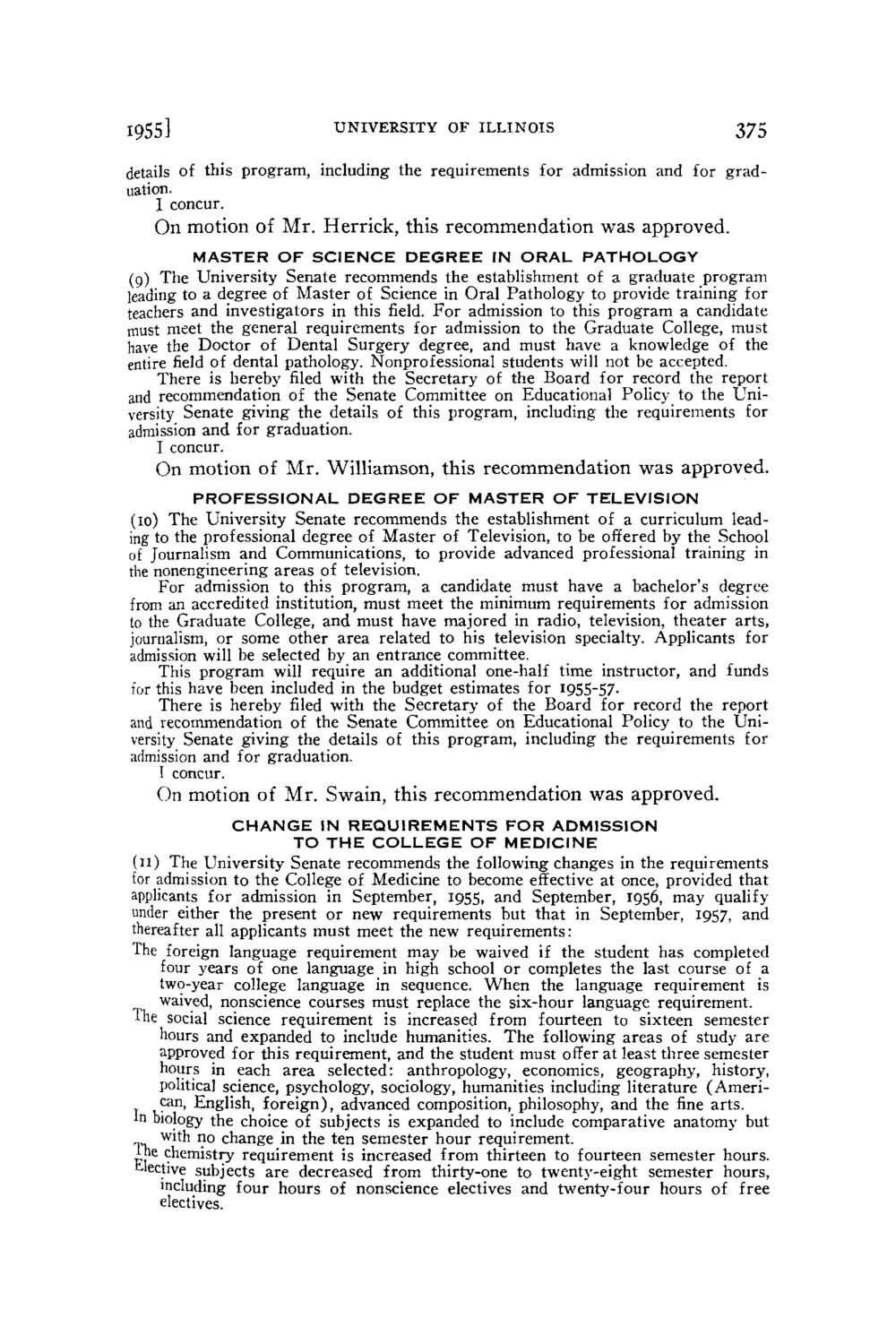| |
| |
Caption: Board of Trustees Minutes - 1956
This is a reduced-resolution page image for fast online browsing.

EXTRACTED TEXT FROM PAGE:
1955] UNIVERSITY OF ILLINOIS 375 details of this program, including the requirements for admission and for graduation. I concur. On motion of Mr. Herrick, this recommendation was approved. MASTER OF SCIENCE DEGREE IN ORAL PATHOLOGY (9) The University Senate recommends the establishment of a graduate program leading to a degree of Master of Science in Oral Pathology to provide training for teachers and investigators in this field. For admission to this program a candidate must meet the general requirements for admission to the Graduate College, must have the Doctor of Dental Surgery degree, and must have a knowledge of the entire field of dental pathology. Nonprofessional students will not be accepted. There is hereby filed with the Secretary of the Board for record the report and recommendation of the Senate Committee on Educational Policy to the University Senate giving the details of this program, including the requirements for admission and for graduation. I concur. On motion of Mr. Williamson, this recommendation was approved. PROFESSIONAL DEGREE OF MASTER OF TELEVISION (10) The University Senate recommends the establishment of a curriculum leading to the professional degree of Master of Television, to be offered by the School of Journalism and Communications, to provide advanced professional training in the nonengineering areas of television. For admission to this program, a candidate must have a bachelor's degree from an accredited institution, must meet the minimum requirements for admission to the Graduate College, and must have majored in radio, television, theater arts, journalism, or some other area related to his television specialty. Applicants for admission will be selected by an entrance committee. This program will require an additional one-half time instructor, and funds for this have been included in the budget estimates for 1955-57There is hereby filed with the Secretary of the Board for record the report and recommendation of the Senate Committee on Educational Policy to the University Senate giving the details of this program, including the requirements for admission and for graduation. T concur. On motion of Mr. Swain, this recommendation was approved. CHANGE IN REQUIREMENTS FOR ADMISSION TO THE COLLEGE OF MEDICINE (11) The University Senate recommends the following changes in the requirements for admission to the College of Medicine to become effective at once, provided that applicants for admission in September, 1955, and September, 1956, may qualify under either the present or new requirements but that in September, 1957, and thereafter all applicants must meet the new requirements: The foreign language requirement may be waived if the student has completed four years of one language in high school or completes the last course of a two-year college language in sequence. When the language requirement is waived, nonscience courses must replace the six-hour language requirement. the social science requirement is increased from fourteen to sixteen semester hours and expanded to include humanities. The following areas of study are approved for this requirement, and the student must offer at least three semester hours in each area selected: anthropology, economics, geography, history, political science, psychology, sociology, humanities including literature (American, English, foreign), advanced composition, philosophy, and the fine arts. in biology the choice of subjects is expanded to include comparative anatomy but with no change in the ten semester hour requirement. the chemistry requirement is increased from thirteen to fourteen semester hours. Elective subjects are decreased from thirty-one to twenty-eight semester hours, including four hours of nonscience electives and twenty-four hours of free electives.
| |